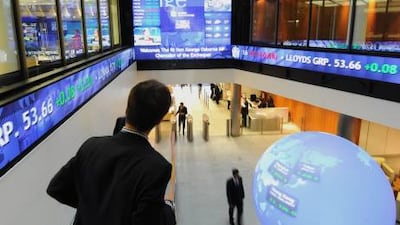UK stocks and the British pound rallied on Thursday after Prime Minister Boris Johnson confirmed he would step down, ending months of political uncertainty in the world’s fifth-largest economy.
The blue-chip FTSE 100 index rose 1.1 per cent to 7,187.27 at 3.05pm UAE time while the mid-cap FTSE 250, which has more exposure to the local economy, was up 0.75 per cent at 18,735.69.
The pound also rallied as high as 1.2016 against the US dollar on Thursday morning after slipping to a two-year low of 1.1899 on Tuesday, when senior cabinet members Sajid Javid and Rishi Sunak announced their resignations.
However, it pared some gains to trade at 1.1985 against the greenback.
“Sterling has moved higher on the back of the news that ‘Borexit’ is happening — Boris is going to leave the office,” Naeem Aslam, chief market analyst at London-based Avatrade, said in a note on Thursday.
“There is no doubt that Boris Johnson has failed the public on many occasions and the fact that he will be leaving is helping the currency and FTSE 100 for now.”
Mr Johnson succumbed to a party rebellion on Thursday morning, telling the Conservative party he would stand down as leader and hand over to a successor.
Officials said Mr Johnson had spoken to Tory 1922 Committee chairman Sir Graham Brady and agreed to stand down, with a new Tory leader set to be in place by the party conference in October.
However, analysts were wary about the effect that Mr Johnson’s resignation would have on UK markets, the slowing economy and weaker pound, which is down almost 12 per cent against the dollar in the year to date.
The UK economy contracted for the second month in a row in April, falling by 0.3 per cent, according to official figures released last month.
In May, inflation in the UK hit 9.1 per cent on annual basis — a new 40-year high — driven by a broad range of price increases, including for fuel, electricity and food.
Earlier this week, the Bank of England said the economic outlook for Britain and the world had darkened and told banks to increase capital buffers to ensure they could weather the storm.
“I don’t believe this resignation will have a big impact on markets,” Micheal Keusch, a fund manager at Bellevue Asset Management, told Bloomberg.
“It certainly brings incremental uncertainty, but in the grand scheme of things, with all the real big uncertainties around, I don’t think this will be moving the needle much.”
However, the political uncertainty has increased because a large number of cards will now come into play, said Mr Aslam.
“The new prime minister may try to persuade the public by adopting more loose fiscal policy, which could make the BoE’s [Bank of England] job even more difficult, which is trying to bring it down,” Mr Aslam said.
While optimism about Mr Johnson's resignation supported the pound and FTSE indexes on Thursday, traders must look at the situation from a wider lens, Mr Aslam said.
A simple change of leadership is not enough to put the country back on track, he said.
“The challenges are mammoth and options are limited. It is highly likely that a new leader will try several tactics to win votes, such as increasing the minimum wage to battle the soaring cost of living,” he said.
“But the question is how he/she will finance that. More loose fiscal policy will only increase the debt for the country and with soaring interest rates, long-term problems will become only worse.
“But one thing that has worked previously is kicking the can down the road and worry about everything later; traders are likely to bet on this.”
_______________
Chronology: Boris Johnson's multiplying scandals



